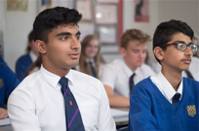"I like learning about different people's sense of morality and how it effects their actions and outlook" Year 9
“The way we are taught about each of the religions, with helpful analogies to make us understand topics effectively" Year 8
“I really like the atmosphere of the lessons, and the learning of different religions is good. I'm thinking about taking it for an A-Level” Year 7
“I enjoyed the ethical and philosophical debates, as well as applying religious views to societal issues" Year 10s
Unlike the vast majority of schools, RE is at the centre of our School’s curriculum. As a Church of England academy, it is highly valued, and we recognise the huge benefits of all students studying it to GCSE.
While all subjects uphold our School’s Intent is particularly shown in our subject in the way we:
- strive to develop a curriculum which is academic, sequential and knowledge-driven
- develop highly literate and knowledgeable students and
- support character development
In Religious Education, students are encouraged to reflect on religious, non-religious, philosophical, moral and spiritual questions. They will have the opportunity to explore a range of world views which highlight the complexity of the world in which they live today.
(Parents have the right to withdraw their children from all or part of RE. See Essential Information Guide.)
Key Stage 3
Our aims are aligned with the Diocese of Peterborough Syllabus for Religious Education. Students will
- know about and understand Christianity as a diverse global living faith through the exploration of core beliefs, using an approach that critically engages with biblical text;
- gain knowledge and understanding of a range of religions and world views, appreciating diversity, continuity and change within religions and world views studied;
- engage with challenging questions of meaning and purpose raised by human existence and experience;
- recognise the concept of religion and its continuing influence on Britain’s cultural heritage and in the lives of individuals and societies in different times, cultures and places;
- explore their own religious, spiritual and philosophical ways living, believing and thinking.
The curriculum is carefully structured, so that there are progressive levels of challenge and high expectations in each year.
In year 7, the students uncover different answers to their enquiry question of "Who is God". Through the lenses of the Abrahamic Faiths (Christianity, Judaism and Islam) they will learn how God can be as the: Creator, Saviour, Promise Keeper, Three in One and Neither Begets nor Begotten.
The year 8 curriculum is centred on the lenses of the Dharmic Faiths - Hindu Dharma and Sikhi. Their focus for this year is to explore whether beliefs shape our actions. The students will begin the year by learning about the Fall and Salvation and how this impacts Christians today.
The purpose of our KS3 curriculum plan is to enlighten our students to the complexities of religion, faith and spirituality. This is supported through our constant development of embedding the multi-disciplinary approach to RE, which studies RE through the lenses of theology, philosophy and social sciences. Furthermore, we aim to develop our students understanding of the contrast between different cultures and world views, which links to their GCSE as they take an in-depth study of Christianity and Buddhism. The Christianity units from Year 7 to Year 8 are aligned with the resources provided by the Understanding Christianity framework. These units are sequenced to enhance students’ understanding of key Christian concepts – Incarnation, Trinity, The Fall and Salvation.
By Year 9, our students are confident in their knowledge and understanding of a range of religions and world views, as well as having enhanced their critical skills of evaluating sacred texts and scripture. To further their character development, knowledge and skills, students engage with units of work on Anti-Racism and Ethics before moving onto their GCSE content.
The Key Stage 3 Religious Education Curriculum Plans can be found at the bottom of this page.
Key Stage 4
- Year 9, 10 and 11 follow the new AQA Religious Studies A (8062) full course GCSE
- GCSE full course: 100% Examination - 2 papers each 1 hour and 45 minutes long
- Component 1 - The study of beliefs, teachings and practices of 2 religions; Christianity & Buddhism
- Component 2 - Thematic studies; (a) Relationships and Families (b) Religion and Life, (d) Religion, Peace and Conflict and Religion and (e) Crime and Punishment.
The Key Stage 4 Religious Education Curriculum Plans can be found at the bottom of this page.
Enrichment Opportunities:
- Lessons delivered by the Souster Youth
Head of Subject - Miss C Moloney

